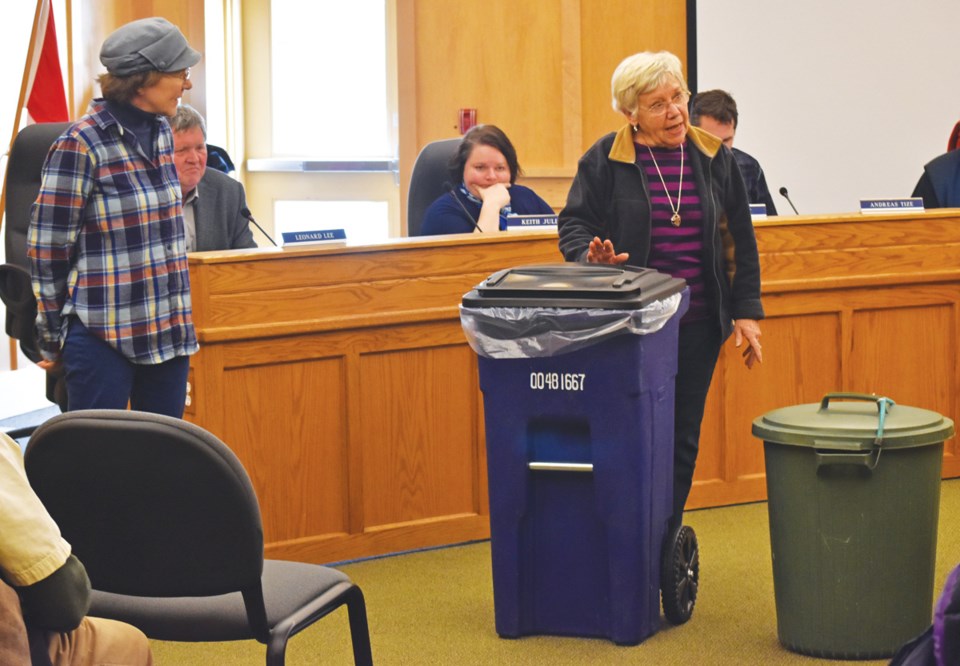Directors wrestled with options for waste collection at a special meeting last Friday in advance of an impending decision on whether to award Waste Management a multi-million-dollar contract for curbside collection in rural areas.
The current contract for Halfmoon Bay, Roberts Creek, Elphinstone and West Howe Sound – residents in Pender Harbour haul their own or hire a private contractor – expires at the end of February. At that point, the SCRD and contractor will enter into a month-to-month agreement until a new contract is signed. Staff estimate the earliest the suite of curbside collection services would start is September.
The new contract would see service extended to include organics pickup weekly, and garbage and recycling every two weeks. Biweekly garbage pickup would only come into effect once organics and recycling pickup is implemented.
There were four bidders, but Waste Management scored highest and was the only one to propose providing all services. The annual estimated base cost to run the service for five years is more than $4.4 million.
The service is paid for by users and currently costs just under $147 for a single-family dwelling, but that amount will rise with the added services. Another major cost could come from the purchase of waste collection bins. If SCRD purchases carts, the combined collection services would cost Area B and D users $252 and E and F users $339. It would cost Elphinstone and West Howe Sound more because those areas are not supported by Recycle BC.
Staff recommended that the SCRD purchase carts up front and then finance them through a loan. It would cost more than $1.5 million for the carts.
The garbage and organics collection wheeled carts would be 134 litres, twice the size of the ones currently used. A recycling cart would be larger, and households would also be supplied with “kitchen catchers” for daily disposal of food waste.
Staff recommended going with the option of purchasing carts rather than having residents supply their own since they don’t think all residents could fit two weeks’ worth of garbage into the current 70-litre containers, even if they recycle and use the organics waste.
This suggestion became a point of contention at the meeting. Elphinstone director Donna McMahon carted her own waste bin into the meeting to show the size difference, arguing the new size is excessive. “This is sending the message to people, throw out more garbage,” she said.
Roberts Creek director Andreas Tize said his driveway is almost half a kilometre long and “I do not want to drive this thing down [it],” adding that many rural residents would have difficulty wielding them. He also agreed the size of the bins sends the wrong message. “The diversion incentive is essentially gone once you put out a garbage can of that size.” He suggested charging by the litre instead, calling it “a real incentive to do some real diversion.”
Chair Lori Pratt said she “worries” about the larger bins and the staff proposal that they adopt a “semi-automated” collection service that would see the heavy-duty collection carts lifted into a truck with a mechanical arm because of its convenience to residents. “I think we need to ask our community to inconvenience themselves. We need to take a stronger stance and be bold about this and not look at the easiest, most automatic solution,” she said. She also saw the purchase of more plastic containers as excessive, since people already own bins.
The discussion around bin size and cost prompted directors to vote that staff include analysis of the cost of service if residents supply their own bins.
Opt-out options for organic waste were also explored, given the proliferation of composters in rural areas – something the previous board had also confronted, and which CFO Tina Perreault confirmed they had decided against.
Curbside pickup, through diversion of organics, green waste and recycling materials, could buy the SCRD about one year more in the lifespan of the landfill, which is set to reach capacity by 2025. In 2011, it had anticipated capacity to be reached by 2030.
No plans have been made to close the recycling depots, but the staff report did note that if recycling pickup takes place, taxation would have to increase to make up funding difference.
During the discussion, directors also expressed concern that they are being compelled to make a decision so close to the contract expiration. “I think it’s pretty obvious the board needs a workshop on this topic. It would have been helpful to have had that a month ago before we got dropped in the deep end with some big decisions to make,” said McMahon.
Earlier in the meeting, CAO Janette Loveys told directors, “There were a number of decisions over the past year that weren’t made, so we’ve now just come to this apex of making decisions.”



